The Queen’s Gambit
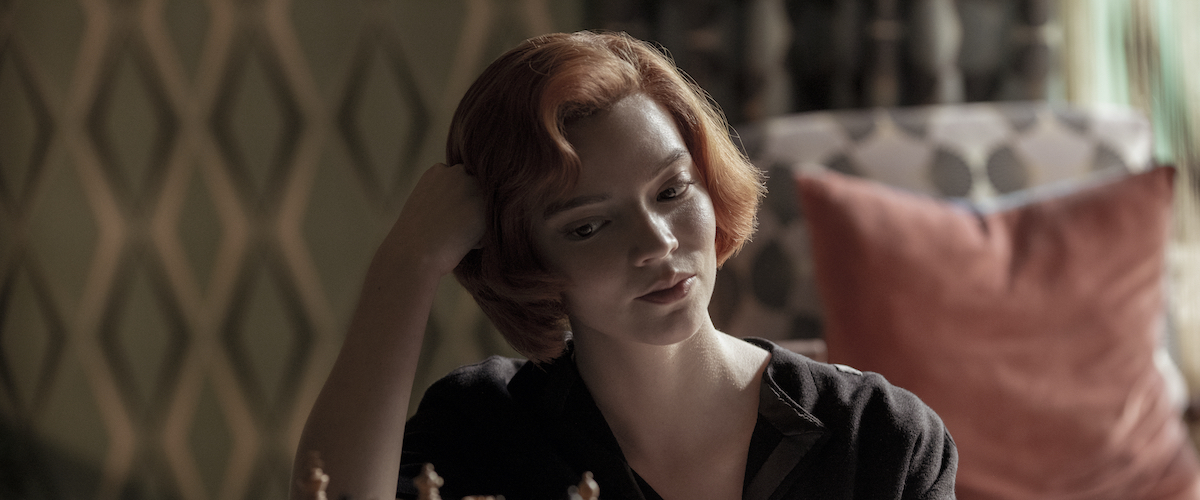
When you read the words “Netflix limited drama series about addiction, obsession, trauma, and chess,” the first adjective which springs to mind is probably not “thrilling.” But here we are, and “The Queen’s Gambit,” Scott Frank ’s adaptation of Walter Tevis ’ coming-of-age novel of the same name, absolutely demands the use of “thrilling.” Anchored by a magnetic lead performance and bolstered by world-class acting, marvelous visual language, a teleplay that’s never less than gripping, and an admirable willingness to embrace contradiction and ambiguity, it’s one of the year’s best series. While not without flaws, it is, in short, a triumph. And it is satisfying not just as a compelling period drama, a character study, and a feast for the eyes. It’s also, at its heart, a sports movie wrapped up in the vestments of a prestige TV series. Ask yourself this: When is the last time you fist-pumped the air over chess? Isn’t that something you deserve?
Odds are that Beth Harmon (the remarkable Anya Taylor-Joy ) will earn quite a few fist-pumps as people discover Frank and co-creator Alan Scott ’s excellent series. We meet Beth as an eight-year-old (Isla Johnson) when she’s left impossibly unharmed—physically, at least—by the car crash that kills her mother. Her father’s not in the picture, so Beth finds herself at a Christian school for orphans. While there, she develops three things: a friendship with Jolene (newcomer Moses Ingram, excellent), a passion for chess, and a physical and emotional dependence on the little green tranquilizers fed to the children until they’re outlawed by the state. When she finally leaves the school, she’s got those last two things packed in her suitcase alongside a bunch of chess books, a sizable ego, some unexplored trauma, and no small amount of self-loathing. But it’s the game that drives her, sending her both to the heights of the competitive chess world and, increasingly, to her hoard of pills and the oblivion offered by alcohol.
In short, Beth has a lot to handle. Luckily, Anya Taylor-Joy is more than up to the task. Playing Beth from 15 onward, Taylor-Joy gives the kind of performance that only becomes more riveting the longer you sit with it. It’s a turn of both intoxicating glamour and precious little vanity, internal without ever being closed-off, heartbreakingly vulnerable and sharply funny, often at once. Much of the story hinges on when and how Beth is alone—and sometimes she’s most alone when surrounded by people—and Taylor-Joy’s performance is particularly remarkable in these moments. Scenes of Beth alone in her home, in a stranger’s apartment, on a plane, in her bed at night—they all hum with the kind of energy that only arises when one is truly unobserved. In this case, however, she’s creating that energy in a room full of cameras and crew members. That kind of honesty and release is the stuff of acting legend, like Eleanora Duse’s blush . It’s yet another high watermark in a young career already full of them, and somehow she’s never better than when Beth is sitting silently behind a chess board.
We’ll come back to those scenes, but it would be a mistake to assume that Taylor-Joy’s only great scene partner is the camera, gazing from across the 64 squares of the board. Frank and casting director Ellen Lewis assembled an ensemble of heavy-hitters, including the great Bill Camp as the isolated janitor who introduces Beth to the game, Thomas Brodie-Sangster and Harry Melling as rivals and eventual allies in the chess world, the wonderful (if underused) Ingram, and director Marielle Heller , who gives a hypnotic performance as the fragile, damaged, compassionate woman who eventually welcomes Beth into her home. There’s not a dud in the bunch; even the actors who show up for a scene or two at most give performances that feel fully inhabited. It’s a stunner of an ensemble.
And here’s a bonus: they all look incredible. “The Crown” is rightly praised for its sumptuous, detailed production design and costuming, and “The Queen’s Gambit” will likely find itself compared to its Netflix predecessor with some frequency. But for all the strengths of “The Crown,” it rarely showcases the kind of imagination on display here. Costume designer Gabriele Binder , hair and makeup head Daniel Parker , and production designer Uli Hanisch (the latter of “ Cloud Atlas ,” “Sense8,” and “Babylon Berlin”) do much more than capture the look and feel of the 1960s in the United States and abroad. They use that aesthetic to illuminate Beth’s mindset. When does Beth embrace the wilder aspects of ‘60s makeup? Why, when she’s balancing precariously on the edge and her thick eyeliner serves to make her look even thinner and more fragile. That’s one example of many. It’s incredibly thoughtful and stylish. Consider it isolated breakdown chic.
The aesthetic of Beth’s inner world is also explored, though to detail what that looks like and what it means is to diminish some of the pleasure (and anxiety) it engenders. Just know that it lends Beth’s struggles a visceral energy that most stories of addiction tend to either take for granted or overplay. And for the most part, that care and thoughtfulness is found in all of the tropes present in “The Queen’s Gambit” (and there are plenty of tropes—this is a sports movie in disguise, after all). That said, Frank’s largely excellent teleplays do occasionally stumble, particularly when it comes to race (Jolene deserves better) and gender. The latter is a shortcoming shared with Frank’s “Godless”—both have their hearts in the right place, but are perhaps not as thoughtful or insightful when it comes to sex, love, and the realities of a patriarchal society than they believe themselves to be.
Frankly, it’s hard to get too worked up about those shortcomings thought, especially when the chess starts. The chess! My god, the chess. Like any good sports movie, this character-driven period drama lives and dies by its editing. Editor Michelle Tesoro should go ahead and buy a bookshelf for all the hardware she’s about to pick up for “The Queen’s Gambit” right now; the chess sequences are all electric, and each in its own way. One will make you hold your breath. Two will likely bring you to tears. Some are funny. Some are infuriating. Some are, somehow, very, very sexy. Each is electric, and Tesoro and Taylor-Joy make them so through skill, talent, and precision. (Some credit here is also due to chess consultants Bruce Pandolfini and Garry Kasparov. I know very little about chess, but somehow “The Queen’s Gambit” convinced me otherwise and dazzled me all at once.)
Every truly great sports story has not one, but two beating hearts. There’s the sport itself, a game or competition in which the viewer becomes undeniably invested. And then there’s the player or players, someone whose life is much bigger than the game, yet is nevertheless somewhat consumed by it. “The Queen’s Gambit” has both those hearts, and both are racing. Frank, Taylor-Joy, and company never stop telling both those stories at once, and the result is a fascinating portrait of a young woman fighting to become the person she wants to be, battling for victory and for peace. When her journey brings her to Paris, she remembers the words of a woman who loved her and spends some time wandering museums, feeding her soul with something more than chess. Yet there’s never any doubt that somewhere, in some corner of her mind, she’s got her eyes on the board. What a privilege it is to see that corner and see the world’s beauty, all at once.
Now available on Netflix


Allison Shoemaker
Allison Shoemaker is a freelance film and television critic based in Chicago.
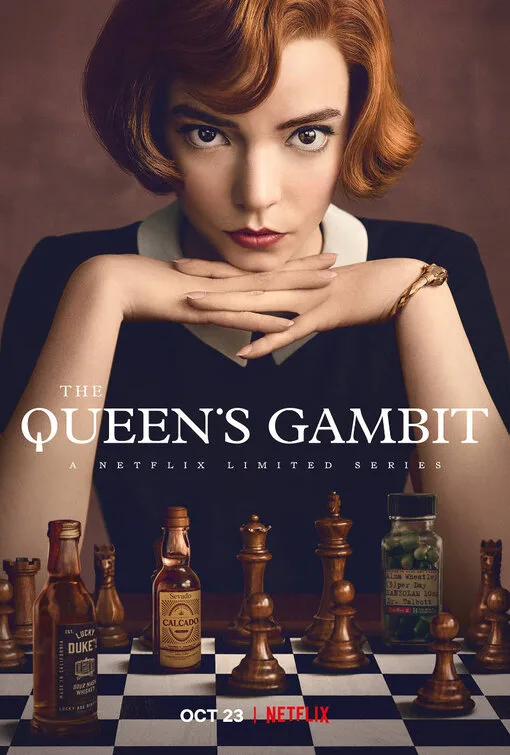
- Anya Taylor-Joy as Beth Harmon
- Harry Melling as Harry Beltik
- Thomas Brodie Sangster as Benny
- Chloe Pirrie as Alice Harmon
- Marielle Heller as Alma Wheatley
- Allan Scott
- Scott Frank
- Walter Tevis
- Carlos Rafael Rivera
- Michelle Tesoro
Cinematographer
- Steven Meizler
Leave a comment
Now playing.

A Real Pain

Here (2024)

Memoir of a Snail
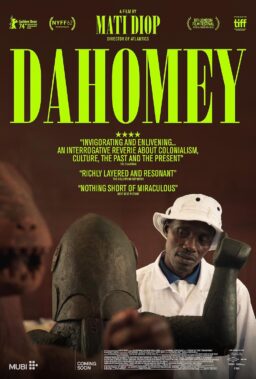
Don’t Move

Road Diary: Bruce Springsteen and The E Street Band

Black Box Diaries

Your Monster
Latest articles.

Our Film Has A Power: Basel Adra and Yuval Abraham on No Other Land

CIFF 2024: The Light of Truth: Richard Hunt’s Monument to Ida B. Wells, Time Passages, Slice of Life: The American Dream. In Former Pizza Huts
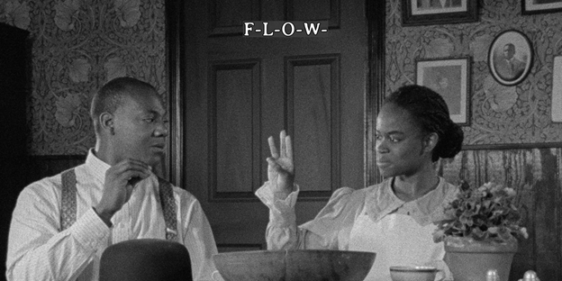
CIFF 2024: Compensation, The Spook Who Sat by the Door, Save the Children

Breakfast Is Served—Again: Alan Rudolph on the reissue of “Breakfast of Champions”
The best movie reviews, in your inbox.
‘The Queen’s Gambit’: A Female Bobby Fischer Keeps Her Challengers in Check
- By Alan Sepinwall
Alan Sepinwall
In the great 1993 chess movie Searching for Bobby Fischer , elementary-school-age prodigy Josh finds himself caught between two mentors: Bruce Pandolfini, an aloof master of the game who favors a slow and risk-averse approach to the board, and Vinnie, who hustles tourists in the park and is always encouraging Josh to play as swiftly and boldly as he can.
The real Bruce Pandolfini was one of the technical advisors for The Queen’s Gambit , a new miniseries about a female chess genius coming of age against the backdrop of the Cold War. (He fulfilled a similar role for the 1983 Walter Tevis novel upon which the Netflix show is based.) So it doesn’t feel entirely coincidental that this version of the story operates at a measured pace. You can practically hear Vinnie grumbling about how this TV take is playing not to lose, rather than to win.
Oh, the story seems to start off at breakneck speed, beginning with Beth Harmon (Anya Taylor-Joy) in a swank Sixties Parisian hotel, popping pills to chase away a bad hangover as she rushes to appear at a press conference about her latest tournament. This, though, is a fakeout: the now-exhausted in media res opening TV writers use when they don’t have confidence that the actual beginnings of their stories are exciting enough. Quickly, we jump away from that glamorous teaser(*) to wade through a whole lot of backstory about young Beth (played at first by Isla Johnston) growing up in a Kentucky orphanage where she and the other girls are heavily medicated.
(*) Almost as frustrating as the use of the in media res device itself is that, by the time we finally return to Paris in a later episode, it’s clear this isn’t a crucial moment in Beth’s story, but simply the one best suited to engage the viewer before the show hit rewind.
Pandolfini, of course, was only hired to offer advice on the chess matches themselves for the book and the show. Complaints about the pacing are better placed at the feet of Scott Frank, who directed every episode and adapted Tevis’ book with Allan Scott, and who has become one of our preeminent champions of the idea that television should simply be constructed as “movies, but longer.”
Editor’s picks
The 100 best tv episodes of all time, the 250 greatest guitarists of all time, the 500 greatest albums of all time, the 200 greatest singers of all time.
Frank actually worked in television early in his career; one of his first credits was a Season One episode of The Wonder Years . Mostly, though, he’s been a terrific writer of genre films like Out of Sight , Minority Report , and Logan . Looking to direct more, he couldn’t get a movie studio to make Godless , his script about the rivalry between two Old West outlaws, set against the backdrop of a frontier town populated entirely by women. So, he sold it to Netflix as a seven-episode miniseries. Godless , released in 2017, has a lot to recommend it. Frank elicits magnetic performances from Jeff Daniels, Merritt Wever, and Michelle Dockery. It’s gorgeously photographed throughout, with several shots jaw-dropping in their composition and staging, and has a rousing action climax. It’s also quite palpably a feature film idea that Frank expanded because he could, and not because the story was best served at that size(*).
(*) Seven hours wound up being almost exactly the wrong length for Godless . The outlaw feud didn’t have enough material to adequately fill that many episodes, while the story of the female-run town still got short shrift. Either contracting or expanding it would have worked better.
But Godless won several Emmys (including trophies for Daniels and Wever), and inspired Frank to bring The Queen’s Gambit to Netflix after Allan Scott (who has been trying to get a movie made ever since Tevis’ book was published) approached him about directing. And the end result is similar: an aesthetically beautiful project with several superb performances, all in service to a story that starts to feel padded long before the end comes.
There’s a degree to which the orphanage scenes are designed to be slow, the better to illustrate how Beth is withering away there from the narcotics and the cool discipline of administrator Helen Deardorff (Christiane Seidel, one of several Godless alums sprinkled through cast and crew). But the point has been well and truly made long before Beth discovers that custodian Mr. Shaibel (the great character actor Bill Camp) plays chess games against himself in the orphanage’s cramped basement. You don’t need to have seen any other chess films — or, for that matter, any stories about precocious talents with gruff older mentors — to know how this is going to go. But Camp plays Shaibel with such gravity, and such obvious, if reserved, affection for this lonely girl, that Beth’s apprenticeship is fascinating even while the other orphanage scenes are repetitive in the extreme.
Anna Kendrick Redirected Her Funds From 'Woman of the Hour' to Charity
Olivia rodrigo says it's the end of her 'guts' era —here's what's next.
Taylor-Joy soon takes over as Beth, and while she’s not especially convincing as a 15-year-old — much less one whom the orphanage passes off as even younger to attract adoptive mother Alma Wheatley (played by A Beautiful Day in the Neighborhood director Marielle Heller) — she proves a spectacular camera subject for Frank and director of photography Steven Meizler. Her face is all oblique angles jutting against a pair of saucer-sized eyes that have to tell a lot of the emotional story, since Beth isn’t much on talking. Between her physical features, the auburn hairstyle crafted by Daniel Parker, and the increasingly stylish mod fashions Gabriele Binder puts her in as Beth’s fortunes rise, Taylor-Joy pops in every scene, even before other characters watch her play and learn what Mr. Shaibel realized about her as a girl: “To tell you the truth of it, child, you’re astounding.”
The early episodes meticulously chronicle Beth learning the game and then establishing herself on the local chess scene. There’s a bit of an underdog flair to these sequences, given how male-dominated the community is, and how no one in her new personal life seems to know or care about chess. Frank and his collaborators (including editor Michelle Tesoro) find interesting ways to construct the tournament scenes — one uses the chess board itself to frame simultaneous matches, for instance — but they run out of new ideas before they get to the last big game. And Beth’s utter domination of opponents who treat her as a novelty loses its capacity to surprise well before the competition starts to take her seriously.
Still, Taylor-Joy’s sheer charisma and range go a very long way, as does the obvious fun Frank is having in blending chess drama with Cold War spy iconography. You may not love mod Sixties hotel architecture as much as Frank and production designer Uli Hanisch so obviously do, but you will likely enjoy many of the gliding shots through these joints as Beth rises from local obscurity to international celebrity, all the way to a big showdown with her Soviet rival. (The soundtrack mostly manages to avoid the era’s greatest hits, but can’t resist Buffalo Springfield’s “For What It’s Worth” in a later episode.)
But Frank and Scott ultimately don’t have enough to say about Beth’s struggles with addiction, mental illness, and the isolation of true genius to sustain the story across seven long episodes. Nor do they take advantage of the extended time to better fill out the world around her. Some supporting players, like Thomas Brodie-Sangster as the cocky reigning American champ Benny, make quick impressions, while other characters and relationships feel underfed. There are hints of a romance between Beth and handsome rival player Townes (Jacob Fortune-Lloyd), but then he vanishes for a long stretch before being treated as an important part of the story’s endgame. And the script never quite reckons with the contradictory nature of Beth having difficulty socializing even while her friends (particularly Moses Ingram as orphanage roommate Jolene) are unwavering in their devotion to her — as if they wanted their fictional, female version of Bobby Fischer to have a happier life than the real one, but didn’t put in all the work to show how she would get it.
Many of these problems would have been alleviated had Frank made The Queen’s Gambit as a film, or even done three or four episodes rather than seven. As with Godless , a lot of this story’s flaws and superficiality only become obvious because of how long it lingers, while the parts that are excellent (Taylor-Joy’s performance, the technical mastery) wouldn’t be diminished in a more abridged version of the tale.
As Beth teaches her adoptive mother about the game, Alma observes of the tournament audiences, “I’ve noticed the moves they applaud loudest are the ones you play rather quickly.” If only The Queen’s Gambit had kept that in mind.
Netflix releases all seven episodes of The Queen’s Gambit on October 23rd.
'Squid Game': Player 456 Reenters the Arena in Latest Season Two Teaser
- red light, green light
- By Daniel Kreps
An Oral History of the 'Midnight Margaritas' Scene in 'Practical Magic'
- Lime in the Coconut
- By Angie Martoccio
'The Diplomat' Is the Rare Netflix Show That Needs More Episodes, Not Fewer
'monsters' star ari graynor prays the menendez brothers will be released from prison.
- By Rachel Brodsky
How Disney's Sleeper Hit 'Hocus Pocus' Changed Salem Forever
- By Shannon Carlin
Most Popular
Anna kendrick says 'f--- you' to director who dissed her in front of 100 extras in order to 'embarrass me and gain dominance': 'it was very icky', ryan reynolds and rob mcelhenney sell minority stake in wrexham football club, acquire u.k. brewery, the golden bachelorette star pascal's love story with joan is about to take a shocking turn, ancient house with erotic frescoes discovered at pompeii, you might also like, amazon bests wall street earnings estimates as ad sales rise 19% in q3, in berlin, adidas’ y-3 puts ‘three stripes in motion’ with dance, the best yoga mats for any practice, according to instructors, this ai animation studio believes it can convince all the skeptics, ohtani hr ball boosts ebay sports collectibles arm, but shares plunge.
Rolling Stone is a part of Penske Media Corporation. © 2024 Rolling Stone, LLC. All rights reserved.
Advertisement
Supported by
‘The Queen’s Gambit’ Review: Coming of Age, One Move at a Time
Anya Taylor-Joy plays a brilliant and troubled young woman who medicates herself with chess in Scott Frank’s mini-series for Netflix.
- Share full article

By Mike Hale
Openings matter a great deal in chess, and “ The Queen’s Gambit, ” a new Netflix mini-series about a wunderkind of the game, uses its first few minutes for the purposes of misdirection. A young woman wakes up in a disordered Paris hotel room and washes down some pills with minibar booze while racing to dress for a Very Important Game of Chess. The period is the late 1960s and the vibe is Holly Golightly groovy wild child.
But “ Gambit ,” whose seven episodes premiere on Friday, pulls that particular rug out from under us right away. It jumps back a decade or so, to when Beth, the fictional future prodigy (played as a child by Isla Johnston), is placed in a Kentucky orphanage after surviving the car crash that kills her mother. It’s a repressively parochial place that keeps the girls sedate by feeding them tranquilizers from a big glass jar, but the awkward, introverted Beth finds another kind of escape when she discovers chess.
This opening episode — written and directed, as is the whole series, by Scott Frank (“Godless”) based on a novel by Walter Tevis — has an enchanting, storybook feel. Beth stumbles on the game when she’s sent on an errand to the basement lair of the orphanage’s forbidding custodian, Mr. Shaibel (a canny, finely etched performance by Bill Camp). The game immediately makes sense to her — when nothing else in her life does — and at night she runs through the moves he teaches her on an imaginary board she sees among the shadows of the prisonlike dormitory where she sleeps.
From there, as Beth (now played by Anya Taylor-Joy ) is adopted out of the orphanage and her prowess gradually gains public notice, “Gambit” proceeds straightforwardly through her teenage years, showing us how she becomes the glamorous but troubled chess pro of that opening scene. It follows the beats of a sports tale, like a classic Hollywood boxing film, but it’s also a coming-of-age story about a woman succeeding in a male-dominated world, and a restrained spin on an addiction saga, as Beth rises in the chess hierarchy on a steady diet of alcohol and downers.
Frank wraps it all up in a package that’s smart, smooth and snappy throughout, like finely tailored goods. The production has a canny combination of retro Rat Pack style, in its décors and music choices, with a creamy texture, in its performances and cinematography, that is reminiscent of another Netflix period piece, “The Crown.” (This connection is reinforced by the abundance of British actors playing the American roles, including Taylor-Joy and, as three mentors and competitors for Beth’s affection, Thomas Brodie-Sangster, Jacob Fortune-Lloyd and Harry Melling.)
“Gambit” never quite gets back to the charm of its Dickensian opening chapter, though, and it gets thinner as it goes along. Frank pulls off his combination of themes with a lot of old-Hollywood-style skill, but in the mix, neither the sports nor the personal-demons story line hits the levels of visceral excitement or emotional payoff that you might want. In the end, it was an admirable package that I wanted to love more than I did.
That may have had something to do with the construct around which the story is built. Beth finds a refuge in chess — it’s a predictable place where she feels safe and in control. And we’re shown why she needs a refuge, beginning with flashbacks to life with her brilliant, troubled biological mother (Chloe Pirrie) and continuing through her teen years with her alcoholic, depressed adoptive mom (an excellent Marielle Heller, who directed the female coming-of-age film “The Diary of a Teenage Girl").
Both of those elements make sense. But the question that becomes the central theme of the series — whether Beth can overcome, or even survive, the obsessiveness that powers her success and the anger that’s reflected in her superaggressive style of play — is primarily melodramatic, a fact reflected in the show’s unsatisfying conclusion.
Beth has some stumbles as she progresses from local phenom to international sensation, but they’re negligible. “Gambit” is nominally a story about overcoming great odds, but in form, it’s really a race against time: Will Beth’s remorseless rise reach a satisfying conclusion (a victory over a courtly Russian champion played by Marcin Dorocinski) before she flames out?
It’s not hard to put that out of your head and enjoy the show’s immediate pleasures, though. They include the performances of Camp, Heller, Brodie-Sangster and Taylor-Joy, who doesn’t go deep inside Beth — that would be a different show — but finds the intelligence and the humanity that lie just beneath her tics and frostiness. And Frank gives them entertaining scenes to play, as Beth gradually discovers the world — chess takes her on a journey from the Midwest to Las Vegas, New York, Paris and Moscow — and embarrassingly defeats one man after another, in chess-game scenes that are staged and shot in different, clever ways throughout the series.
If it doesn’t win you over, “Gambit” will at least play you to a draw.
Mike Hale is a television critic. He also writes about online video, film and media. He came to The Times in 1995 and worked as an editor in Sports, Arts & Leisure and Weekend Arts before becoming a critic in 2009. More about Mike Hale
Explore More in TV and Movies
Not sure what to watch next we can help..
Jump Scares That Still Make Us Jump : With Times film writers, filmmakers and stars weighing in, we ranked the 25 most chilling, spine-tingling, utterly terrifying scenes that get us every time.
Is ‘Conclave’ Accurate? : Edward Berger’s new film isn’t the first to involve a papal election, but perhaps no other has focused so much on the liturgical details .
Seth Meyers Isn’t as Nice as You Think : The “Late Night” host has crafted a comedically precise but genial persona. A new stand-up special finds him reveling in his more acerbic side .
Streaming Guides: If you are overwhelmed by the endless options, don’t despair — we put together the best offerings on Netflix , Max , Disney+ , Amazon Prime and Hulu to make choosing your next binge a little easier.
Watching Newsletter: Sign up to get recommendations on the best films and TV shows to stream and watch, delivered to your inbox.
Log in or sign up for Rotten Tomatoes
Trouble logging in?
By continuing, you agree to the Privacy Policy and the Terms and Policies , and to receive email from the Fandango Media Brands .
By creating an account, you agree to the Privacy Policy and the Terms and Policies , and to receive email from Rotten Tomatoes and to receive email from the Fandango Media Brands .
By creating an account, you agree to the Privacy Policy and the Terms and Policies , and to receive email from Rotten Tomatoes.
Email not verified
Let's keep in touch.

Sign up for the Rotten Tomatoes newsletter to get weekly updates on:
- Upcoming Movies and TV shows
- Rotten Tomatoes Podcast
- Media News + More
By clicking "Sign Me Up," you are agreeing to receive occasional emails and communications from Fandango Media (Fandango, Vudu, and Rotten Tomatoes) and consenting to Fandango's Privacy Policy and Terms and Policies . Please allow 10 business days for your account to reflect your preferences.
OK, got it!
- About Rotten Tomatoes®
- Login/signup
Movies in theaters
- Opening This Week
- Top Box Office
- Coming Soon to Theaters
- Certified Fresh Movies
Movies at Home
- Fandango at Home
- Prime Video
- Most Popular Streaming Movies
- What to Watch New
Certified fresh picks
- 93% Conclave Link to Conclave
- 94% A Real Pain Link to A Real Pain
- 95% Memoir of a Snail Link to Memoir of a Snail
New TV Tonight
- 100% Somebody Somewhere: Season 3
- 100% Lioness: Season 2
- 93% The Diplomat: Season 2
- -- Wizards Beyond Waverly Place: Season 1
- -- Tú también lo harías: Season 1
- -- The Marlow Murder Club: Season 1
- -- Buy It Now: Season 1
- -- Finding Mr. Christmas: Season 1
- -- One Shot: Overtime Elite: Season 2
Most Popular TV on RT
- 83% Agatha All Along: Season 1
- 94% The Penguin: Season 1
- 83% Territory: Season 1
- 94% Rivals: Season 1
- 77% Disclaimer: Season 1
- 88% Escape at Dannemora: Season 1
- 100% From: Season 3
- -- The Manhattan Alien Abduction: Season 1
- Best TV Shows
- Most Popular TV
Certified fresh pick
- 85% Sweetpea: Season 1 Link to Sweetpea: Season 1
- All-Time Lists
- Binge Guide
- Comics on TV
- Five Favorite Films
- Video Interviews
- Weekend Box Office
- Weekly Ketchup
- What to Watch
Best Horror Movies of the 2020s (So Far)
Kathryn Hahn Movies and Series Ranked by Tomatometer
What to Watch: In Theaters and On Streaming
Awards Tour
TV Premiere Dates 2024
Wicked First Reactions: It Will Exceed Your Expectations
- Trending on RT
- Wicked Social Reactions
- Verified Hot Movies
- TV Premiere Dates
- Spooky Season

The Queen's Gambit
Where to watch.
Watch The Queen's Gambit with a subscription on Netflix.
Cast & Crew
Scott Frank
Allan Scott
Anya Taylor-Joy
Beth Harmon
Marielle Heller
Alma Wheatley
Thomas Brodie-Sangster
Moses Ingram
More Like This
Related tv news, series info.
‘The Queen’s Gambit,’ Starring a Magnetic Anya Taylor-Joy, Is a Shrewd Study of Genius: TV Review
Following the astonishing rise of an unusual chess prodigy, Netflix's new limited series is a welcome change of pace.
By Caroline Framke
Caroline Framke
Chief TV Critic
- How Streaming TV Turned the Premier League Into a Great American Pastime 2 years ago
- FIFA, Qatar and Cowardly Hypocrisy Has Sucked the Joy Out of Watching the World Cup 2 years ago
- ‘Pitch Perfect: Bumper In Berlin’ Is a Spinoff Without A Purpose: TV Review 2 years ago

In order to be a truly great chess player — not just a good one, but one of the greats — you need to possess a canny combination of concentration, acuity, and nerve. What seems like a simple board of 64 squares quickly becomes a battlefield; the key to winning the ensuing fight is being able to analyze and anticipate an opponent’s moves without your face betraying a single calculation. Chess is such a mentally punishing, esoteric game — which makes it extremely hard to portray onscreen with half the thrill it might have in reality, especially if the viewer doesn’t know all the rules (and chances are, you don’t). But “The Queen’s Gambit” manages to personalize the game and its players thanks to clever storytelling and, in Anya Taylor-Joy , a lead actor so magnetic that when she stares down the camera lens, her flinty glare threatens to cut right through it. Most crucially, the series uses chess as its engine for a more complicated narrative about female genius, the allure of addiction and the gift of autonomy.
Related Stories

Disneyland Price Hikes Show Disney’s Faith in Planned Expansions for Reigniting Demand

'Presence' Trailer: A Ghost Is the Camera's POV and Haunts a Family in Steven Soderbergh's Eerie Horror Movie
From writer and director Scott Frank (“Logan”), and based on Walter Tevis’ 1983 novel, “The Queen’s Gambit” tells the story of a taciturn orphan whose unflinching demeanor and analytical brain reveal her to be a lethal chess prodigy. When we first meet 9 year-old Beth (Isla Johnston) in Kentucky circa the early ’60s, she’s adjusting to life at a Kentucky orphanage while quietly mourning the sudden death of her mother (Chloe Pirrie). Then, a chance encounter with the custodian (Bill Camp) introduces her to chess, and it’s as if the game unlocks a secret room within her own mathematical mind where everything makes sense, a place where she can be safe and in control. That Beth discovers this about herself at the same time as the orphanage is giving her a daily tranquilizer only intensifies her obsession. She spends years lying awake at night, high as a kite, staring at her ceiling where ghostly apparitions of chess boards appear to let her play as many games as she wants. In these moments, “The Queen’s Gambit” almost becomes an “Alice in Wonderland” story — except in this case, the heroine is an unsettling orphan playing chess on her ceiling through a drugged fog.
Popular on Variety
The series, written and directed entirely by Frank, sometimes threatens to get overwhelmed by these breaks in reality and format, and the CGI chess pieces are only occasionally as sinister as they’re supposed to be. At the show’s bluntest moments, Beth’s time in the orphanage and early childhood flashbacks often feel like they’re of an entirely different show. But as Beth grows up (and is subsequently played by Taylor-Joy), “The Queen’s Gambit” becomes very shrewd about its choices and keeps the narrative going at an impressively fast clip — making it a sharp, welcome contrast to the all too many lethargic streaming dramas out there.
Unfolding over seven episodes, the limited series follows Beth’s rise to the top of the competitive chess world and all the work she does and the suffering she endures to get there. Growing up, her closest ally is the custodian and her bunkmate Jolene (Moses Ingram); once she leaves the orphanage, her confidante becomes her adoptive mother Alma ( Marielle Heller ), a lonely woman in need of company outside her spiteful husband. Ingram makes the absolute most of sometimes clunky dialogue (Jolene is the only major non-white character in the series, and it shows). And while Heller’s mostly known for her patient, empathetic directing of films such as “A Beautiful Day in the Neighborhood,” she brings the same qualities to her acting here, deepening Alma’s characterization into something so painfully tender she might as well be a walking bruise. Both flesh out characters that most obviously show Frank’s limits as a writer, giving them welcome depth beyond the page.
While Jolene and Alma get the closest to cracking Beth’s heart, she’s otherwise constantly surrounded by men. She resents that fact being pointed out to her with every chess match she obliterates, but with her shock of bright red hair and increasingly glamorous wardrobe (courtesy of costume designer Gabriele Binder), Beth also takes some pleasure out of drawing everyone’s intrigued eye. Along the way to the top, she collects the hearts of men equally frustrated and enthralled by her: a sincere local boy (Henry Melling), a fellow cocky prodigy (Thomas Brodie-Sangster), a kind-eyed writer (Jacob Fortune-Lloyd) who comes the closest to stealing her heart right back. Even the steely Russian champion (Marcin Dorocinski) whose face rarely moves an inch finds himself drawn to this strange girl and her astonishing mind. Countless chess matches begin and end on Beth’s face as she stares coolly across the board at her opponent, waiting for the moment she can strike him down. In most actors’ hands, these scenes would become too boring for words. In Taylor-Joy’s, they’re mesmerizing.
It’d be easy for the show to indulge too much in Beth’s allure and make her some sort of Manic Pixie Dream Genius, and it doesn’t always resist the temptation. But more often than not, it dives deep enough into her psyche and reveals enough weaknesses that she’s never invincible or unknowable. She’s a mastermind, but also an angry obsessive with a healthy ego and a love for obliterating herself before anyone else can do it to her. She wants to win, but more than that, she wants some place — someone — to call home. When “The Queen’s Gambit” gives both Beth and Taylor-Joy the room to tap into the twin veins of her fury and longing, it’s the best kind of bildungsroman. What could’ve just been a clever show quickly becomes a portrait of a special, flawed person that reveres her fire as much as her brilliance.
“The Queen’s Gambit” premieres Friday, October 23 on Netflix.
- Crew: Executive producers: Scott Frank, William Horberg, Allan Scott.
- Cast: Anya Taylor-Joy, Marielle Heller, Thomas Brodie-Sangster, Moses Ingram, Harry Melling and Bill Camp.
More from Variety

Adam Schiff Urges Federal Incentive to Keep Film and TV Production in U.S.

Why SAG-AFTRA Is Smart to Threaten Holiday Gaming Boycott

‘Saturday Night Live’ Visual Effects Artists Unionize With IATSE

New Live Music Data Suggests Cautious Optimism
More from our brands, ryan reynolds wishes taylor swift could experience eras tour ‘phenomenon’ from the crowd.

Angel’s Envy Used Two Different Port Barrels for Its New Cask-Strength Bourbon

Unrivaled Expands Roster Spots as Caitlin Clark Decision Looms

The Best Loofahs and Body Scrubbers, According to Dermatologists

FBI Twist: Lisette Olivera Exiting as Series Regular Ahead of On-Screen Debut

- Entertainment
- Netflix’s Marvelous <em>The Queen’s Gambit</em> Is the Kind of Prestige Drama TV Doesn’t Make Anymore
Netflix’s Marvelous The Queen’s Gambit Is the Kind of Prestige Drama TV Doesn’t Make Anymore
A re TV dramas OK? I ask because, sometime during the past decade, a format once rooted in the daily struggles of more-or-less normal human beings came a bit unglued. So-called prestige drama got darker, stranger, flashier, pulpier, scarier or simply more intense. Forced by a surplus of original content to find a gimmick, many TV creators have turned away from realistic stories, to embrace fantasy, sci-fi, superheroes, melodrama. Maybe the tipping point was Game of Thrones . Maybe it was American Horror Story or The Walking Dead or even Downton Abbey ’s metamorphosis from stodgy period piece to self-aware soap. Now, pay TV platforms such as HBO and Amazon are loading up on genre fare—some but not all of it great. Emotional dramas like Six Feet Under and Friday Night Lights have given way to the mawkish This Is Us . Procedurals are getting weird; The Good Wife team begat Evil . And the most authentic, vividly wrought characters of the last several years have mostly come from half-hour dramedies: Fleabag , Atlanta , Enlightened , BoJack Horseman , Better Things , Insecure , Catastrophe , Vida .
At this point, any hour-long drama that forsakes intellectual property, narrative histrionics and expensive special effects in favor of psychological realism represents a welcome change of pace. And one as excellent as The Queen’s Gambit feels very rare indeed. An adaptation of the novel by Walter Tevis ( The Hustler , The Man Who Fell to Earth ) that comes to Netflix on Oct. 23, the absorbing seven-part miniseries is first and foremost a character study. Its hero, orphaned chess prodigy Beth Harmon, may not be the typical mid-20th-century girl. But hers is essentially a coming-of-age story—one that asks what awaits a brilliant, precocious loner in adulthood. The show’s suspense comes less from the question of whether she’ll grow up to become the world champion than from the question of whether she’ll grow up to be reasonably stable and happy.
Played as a child by Isla Johnston and later, in a transcendent performance, by Anya Taylor-Joy, Beth arrives at a Kentucky orphanage after surviving a car crash that kills her mother. It’s the late 1950s, and instead of getting the opportunity to talk through the precariousness of growing up without a family, wards of the state have their trauma managed by two-toned green tranquilizer capsules. Jolene (sharp newcomer Moses Ingram), a kind, resilient older girl who has been repeatedly passed over for adoption—probably because she’s Black—becomes a surrogate big sister to the taciturn, self-possessed Beth. Her advice: save those fun green pills for bedtime.
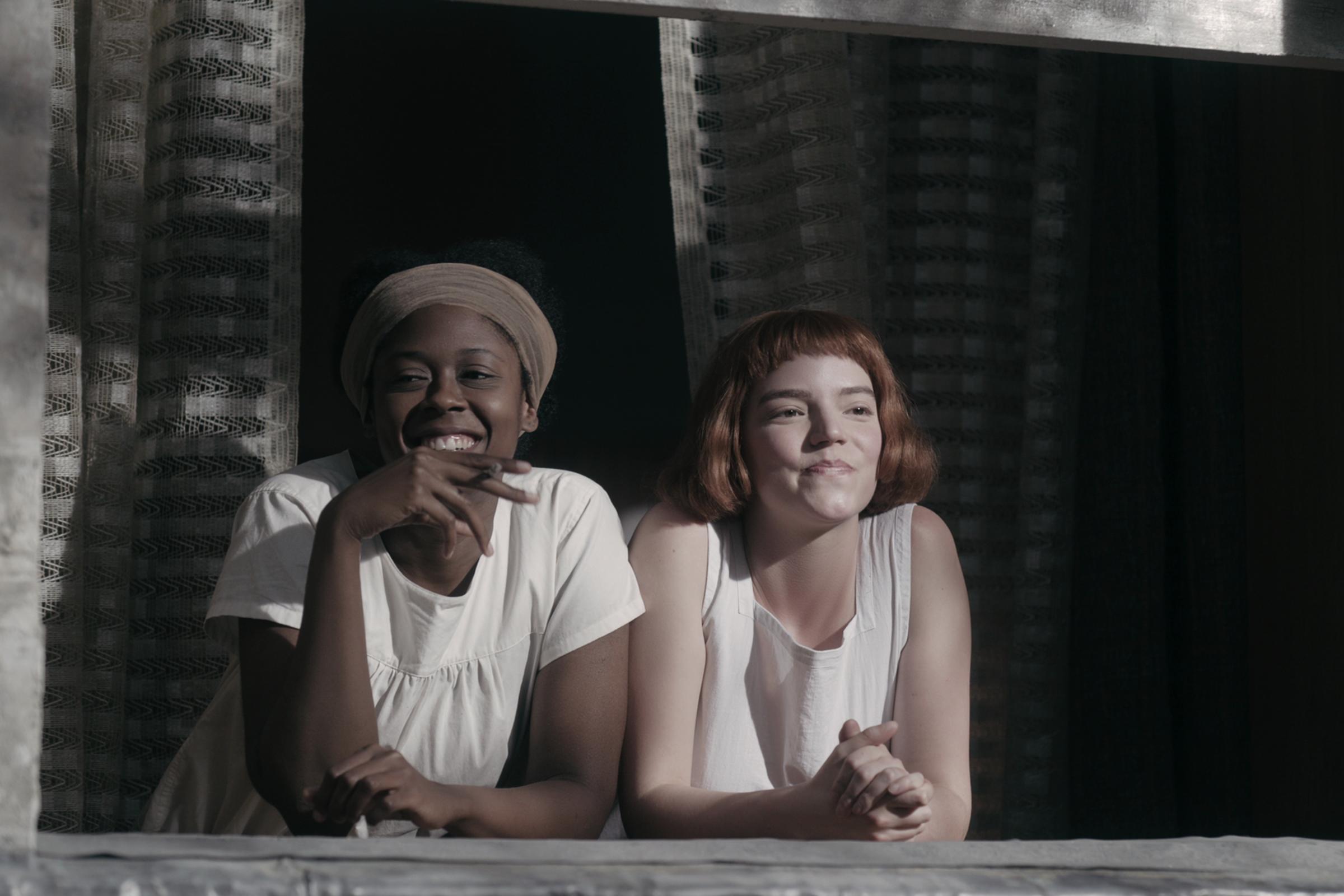
Sent to clap out erasers in the basement by a math teacher with nothing left to teach her, Beth meets the closest person she’ll ever have to a father figure: Mr. Shaibel (the wonderful Bill Camp), a grumpy janitor who spends idle moments gaming out chess moves. She’s obsessed with the game before she even knows what it’s called. High on meds she’s taken to hoarding, she envisions chessboards on the shadowy ceiling of her dormitory and loses hours playing through imaginary matches. It doesn’t take long for her to start beating Shaibel, then the head of his chess club and the star of the local high school team. By the time a couple in suburban Lexington adopts her, after four or five years at the orphanage, Beth knows chess is her destiny.
But she’s painfully out of place in her new home—a worst-case-scenario implementation of the Dorothy Draper aesthetic, all heavy curtains and plush carpeting and floral wallpaper in shades of fuchsia and turquoise. Like the doll she receives as a gift while at the orphanage and deposits directly into the trash, her pink bedroom assumes an affinity for the trappings of traditional femininity that she never developed. At school, teenybopper girls in identical sweaters and circle skirts make fun of her stiff pinafores and short, blunt, institutional bob. (The Anna Wintour look doesn’t quite work on a teenager.) But with her adoptive father always away, supposedly on business, and her new mom (played with astonishing sensitivity by Can You Ever Forgive Me? director Marielle Heller) perennially beer-drunk at home, 15-year-old Beth finds her way back to chess.
By episode three, the sports arc has kicked in, as Beth rises from local curiosity—a teen girl who handily defeats men more than twice her age—to international star. Though they eventually started to feel a bit repetitive to this novice, the chess matches are mostly exciting and, as far as I could tell, realistic. (Russian chess eminence Garry Kasparov consulted on the show.) German production designer Uli Hanisch, of Babylon Berlin , imports that series’ glamour and scrupulous historical detail to create immersive renderings of Paris, Moscow and Mexico City in the ’60s. In his Pop Art Las Vegas, a stack of huge, glittery dice are the centerpiece of the glassy hotel lobby, with smaller versions carved into the wooden room dividers.
Yet it’s Beth and her relationships that remain the focal point. A lesser adaptation might reduce her to an antihero of Don Draper or Olivia Pope proportions—a genius at work but selfish, manipulative, destructive and sometimes plain nasty in her personal life. Instead, writer-director Scott Frank ( Godless ) uses Beth’s interactions to draw out this strange girl’s unacknowledged longing to connect. In Heller’s Alma, a pianist who chose marriage over career, she finds an unlikely kindred spirit: a woman who seeks excitement, and who too often finds it at the bottom of a cocktail glass or a pill bottle. Their partnership could easily be depicted as mutually exploitative, with the underaged Beth taking advantage of Alma’s restlessness to keep entering tournaments and Alma using Beth for prize money and an excuse to leave her ugly living room. Though it starts out that way, what develops later is a surprisingly tender familial bond.
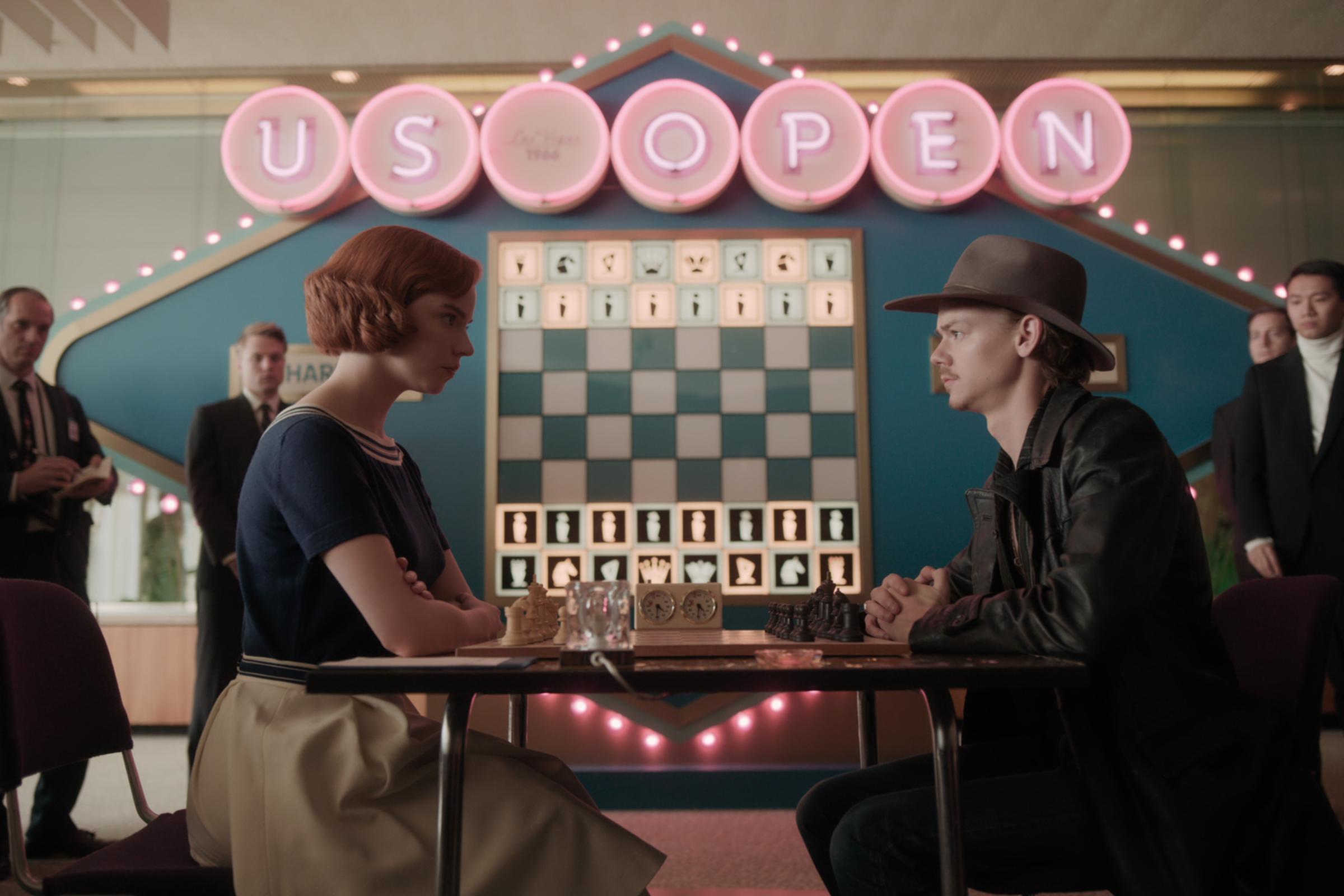
Meanwhile, chess brings men into Beth’s life. Hotshot players Beltik (Harry Melling, a Harry Potter alum most recently seen in The Old Guard ) and then Benny (Thomas Brodie-Sangster of Godless and the Maze Runner movies), a pipsqueak whose bohemian leatherwear reads as a doth-protest-too-much rejection of the chess nerd stereotype, fall under a spell she’s unaware of casting. Just as you feel a familiar dynamic forming, in which a talented woman ends up intimidating her suitors, The Queen’s Gambit swerves; it’s probably no coincidence that a story about chess thrives on confounding audience expectations. For her part, Beth carries a torch for a man (Jacob Fortune-Lloyd) she trounces in her first-ever tournament.
For actors as well as writers, it’s hard to portray a character like Beth without falling prey to what is sometimes called the “not like other girls” trope —in this case, the implication that it’s her divergence from gender norms that make this blunt, confident, poker-faced young woman extraordinary. Frank avoids this trap by giving her a love of fashion (costume designer Gabriele Binder uses exquisite period costumes to capture an increasingly sophisticated character whose self-image never stops evolving) and by centering her heartfelt friendships with other women.
Taylor-Joy is the final, most crucial piece in the Beth Harmon puzzle. A 24-year-old who broke out in 2015’s terrifying The Witch when she was still in her teens, the actor has since genre-hopped from horror to black comedy ( Thoroughbreds ) to Jane Austen (the most recent Emma adaptation) in a series of stunning performances. It isn’t so much an alternate take on the ingénue that she brings to each of these roles, although she has a rare, arresting beauty. What radiates from her unfeasibly large, ultra-alert eyes is an intensity that verges on otherworldly. If she’s not like other girls, it’s because she might be the remarkably expressive prototype for a new and improved model of human. That, more than anything, is Beth. “Her deep passion for chess is the passion that I have for my art,” Taylor-Joy has said . “It felt easy to transfer the emotion.” Watching one of the year’s most fascinating TV characters ascend to the mid-century chess firmament, you believe her.
More Must-Reads from TIME
- How the Electoral College Actually Works
- Your Vote Is Safe
- Mel Robbins Will Make You Do It
- Why Vinegar Is So Good for You
- The Surprising Health Benefits of Pain
- You Don’t Have to Dread the End of Daylight Saving
- The 20 Best Halloween TV Episodes of All Time
- Meet TIME's Newest Class of Next Generation Leaders
Contact us at [email protected]
- Login / Sign Up
Support fearless, independent journalism
The election is less than a week away and the stakes are higher than ever. Despite the need for strong independent journalism, it is under attack, both from politicians and from billionaires who hold power. At Vox, we lead with courage and call things as we see them . We know the stakes of this election are huge, and we believe you deserve to understand how the outcome will affect your life.
We rely on readers like you to fund our journalism. Will you support our work and become a Vox Member today?
- Recommendations /
- One Good Thing
One Good Thing: Netflix’s The Queen’s Gambit makes chess mesmerizing. Really!
The seven-episode miniseries shows why Anya Taylor-Joy is one of the most exciting actors working today.
by Emily St. James

Chess shouldn’t be all that interesting to watch on screen, for probably obvious reasons. The game involves a lot of people sitting and staring at a board, moving pieces around in quiet contemplation. And unless you’re a major chess fan, the moves the players make won’t immediately make sense in the way a baseball player hitting a home run does.
But something that is interesting to watch onscreen is a great actor playing a compelling character who has a lot going on in their mind. A close-up on the actor’s face as the wheels turn in the character’s head can be gripping because attempting to think your way out of a problem is something we all have experienced.
So the smartest choice Scott Frank makes in adapting Walter Tevis’s 1983 novel The Queen’s Gambit into a seven-episode Netflix miniseries is to focus not on the chess but on his actors’ faces, particularly that of his star. As chess prodigy Beth Harmon, Anya Taylor-Joy gives one of my favorite performances in ages. And Frank shows an understated confidence in relying not on fancy camera tricks but on close-ups that watch the star’s slightly too-wide eyes flicker with recognition as she finds the move to trounce yet another challenger.
The central conflict of the miniseries isn’t Beth vs. a world that keeps underestimating her, as it seems to be on its face. The central conflict is the viewer vs. Beth, as you try to find your way inside her rapidly whirring brain, and almost do, before she shuts you out again.
Beth is an orphan in 1950s Kentucky, who discovers an abiding love of chess almost by accident, thanks to a gruff old janitor (Bill Camp) who works at the orphanage she is sent to after her mother dies in a car accident. (Isla Johnston plays Beth as an orphaned child before Taylor-Joy takes over the role when Beth turns 15.) But when Beth is adopted by a middle-aged couple in the early 1960s and encouraged by her adoptive mother (Marielle Heller) to pursue her chess hobby further, she rapidly starts climbing the ranks of the world’s best players.
That’s kind of it, so far as the story goes. The Queen’s Gambit is an underdog narrative —nobody expects a woman to be good at chess! — meshed with a coming-of-age character study. How much of Beth’s motivation stems from the uncertainty of her childhood, of her adoption, of her bouncing from an orphanage to public school as a teenager? And how badly do the addictions that she develops to pills and alcohol, almost as part of her training, hinder her progress?
Her traumas and her addictions must drive her on some level, but at no point does she monologue painfully and at length about how losing her mother pushed her to be better. She just has to be better because she has to be better. If she ever stopped and looked too closely at the reasons she behaves the way she does, she might completely fall apart.
Taylor-Joy is one of my favorite performers working today, and she’s exceptional here. The best chess players in the world know when they’ve won or lost dozens of moves ahead of the game’s completion. Thus, chess very much is a game of faces, and Taylor-Joy’s cerebral acting meshes perfectly with Beth’s story. She’s an actor of micro-expressions, of flickers of eyes and twitches of lips, and what makes The Queen Gambit such a good fit for her is the way she keeps both the viewer and Beth’s opponents at arm’s length.
Competition stories are often a great way to do character studies, especially when the competitions are one-on-one. Weirdly, the story I thought of most often while watching The Queen’s Gambit was Martin Scorsese’s 1980 film Raging Bull . The surface resemblance between the two is faint, but they’re both about self-destructive, preternaturally talented people who wrestle with the gendered expectations of the society they exist in, with top-notch performances from actors at the height of their craft.
I spent most of The Queen’s Gambit nervous that the miniseries was going to become a story about Beth having to learn how to be a woman or something because she has turned off so much of herself to focus on being great at chess. But Frank’s scripts focus not on something so clichéd but on Beth stubbornly hammering at her own humanity until it fits the peculiar circumstances of her existence. The series is about how the mere fact of her being a woman causes other players to underestimate her, but only on its margins. By the time she’s credibly competing for the US championship, everybody takes her seriously. The Queen’s Gambit is not a story about a woman overcoming the odds to show the world her girl power; it’s a story about a woman overcoming the odds to understand herself. (And lest I leave the impression the series is all Taylor-Joy, the entire cast of the miniseries is perfect.)
It’s also a miniseries about chess, one that slowly but surely teaches you important truths about the game, so that by the time Beth is playing the much-vaunted Soviet chess players, you get the gist of the games, even if you don’t grasp each and every nuance. You’ll understand just why it’s advantageous to play white instead of black, but you’ll also understand how the built-in disadvantage black holds reflects some of the ways Beth sees herself, even if she would never say that.
Another movie I thought of while watching The Queen’s Gambit was Mike Leigh’s terrific 2008 comedy Happy-Go-Lucky . What I love about that movie is that its central character — an extraordinarily kind and, well, happy-go-lucky woman — doesn’t undergo some awkward character arc in which she realizes the world is darker and more cynical than she expected. Instead, she forces the world to realize the viability of her point of view.
The Queen’s Gambit has flaws. It’s maybe a little too long. Frank is perhaps slightly too enamored of watching his star cavort around in her underwear. And the series’ one major character of color (Beth’s Black best friend Jolene, played wonderfully by Moses Ingram) is a thankless role. But The Queen’s Gambit also has a healthy dose of Happy-Go-Lucky- ness at its core, in a way that almost makes it a mirror image of that film. Beth Harmon forces the world to reckon first with her talent and then with her pain. The world bends around her in turn, without pressuring her to be anything she’s not. Sometimes, that’s enough.
The Queen’s Gambit is streaming on Netflix . For more recommendations from the world of culture, check out the One Good Thing archives.
- Recommendations
Most Popular
- The Republican Supreme Court just blessed an illegal voter purge
- The big lie behind Biden’s “garbage” gaffe scandal
- How safe is your vote from manipulation?
- Gen Z is shocked by Trump’s Access Hollywood video. We should be, too.
- Who came out looking the worst on Love Is Blind season 7
Today, Explained
Understand the world with a daily explainer plus the most compelling stories of the day.
This is the title for the native ad
More in One Good Thing

In The Year of Miracles, Ella Risbridger cooks through the end of the world.

Carly Pearce’s 29: Written in Stone turns a tumultuous year of her life into a near-perfect divorce album.

The latest season of Borgen is a political thriller for the Great Resignation.

In Chungking Express and Rebels of the Neon God, the vibes are melancholy but incredibly aesthetic.

A gothic album, soaring with gorgeous darkness.

Netflix’s The Parisian Agency is a luxury real estate show featuring a family that actually gets along.
The Queen’s Gambit is an intoxicating chess thriller
Anya Taylor-Joy’s alcoholic chess prodigy puts herself to the test in Scott Frank’s enthralling new Netflix series that proves again that the novels of Walter Tevis are fertile ground for adaptation.

▶︎ The Queen’s Gambit is on Netflix in seven episodes.
The slender output of American novelist Walter Tevis (1928-84) divides equally between literary yet page-turning novels about niche competitive sports and dystopian science fiction. It’s always puzzling and stimulating that one writer produced source material for superficially different yet classic auteur films – Robert Rossen’s The Hustler (1961), based on Tevis’s 1959 novel about pool, and Nicolas Roeg’s The Man Who Fell to Earth (1976), based on the 1963 novel.
Now Scott Frank’s Netflix ‘limited series’ adapts Tevis’s 1983 novel about a female chess grand master. In an apt fusion of previous screen Tevis protagonists, the huge-eyed Anya Taylor-Joy is at once as obsessive and savant-like a game-player as Paul Newman’s Fast Eddie Felton in The Hustler and as alien-seeming and lost on Earth as David Bowie’s Thomas Jerome Newton in The Man Who Fell to Earth.
The thread that binds the strands of Tevis’s work is alcoholism: he described writing about an extra-terrestrial visitor marooned on our strange planet as a way of self-diagnosing the long-term effects of his drink problem. Taylor-Joy’s Beth Harmon is a portrait of an alcoholic woman on par with Piper Laurie’s in The Hustler and Candy Clark’s in The Man Who Fell to Earth (she even, in some lights, resembles both). The heroine’s self-destructive, raggedly glamorous behaviour – at her lowest, she dances alone in her underwear to Shocking Blue’s Venus while necking bottles of wine – matches Bowie’s similarly fashion-conscious dissolution. However, after Beth’s fall to Earth she reassembles herself for a rematch against Soviet champion Borgov (Marcin Dorocinski), who has the status in the chess world that legendary pool player Minnesota Fats does in the halls of The Hustler.

The plot of The Queen’s Gambit parallels The Hustler, building through preliminary rounds and bildungsroman flashbacks to a climax in which the contender – after losses and humiliations and strokes of good and bad luck – faces her nemesis on the best form of her life and wonders whether that’s still good enough. If it seems a foregone conclusion in sports movies that the young gun will best the old pro, it’s worth remembering it doesn’t turn out that way in The Cincinatti Kid (or Rocky, for that matter).
For Tevis, the player’s first opponent is always themself. Beth survives a tough orphanage childhood after her mad genius mother’s suicide, learning her game from a reclusive janitor (Bill Camp), then adopted by another erratic drunk (Marielle Heller). She sashays out of the 1950s into the 60s, with cool soundtrack and fashion choices, involved with a succession of opponents who become coaches, crushes, lovers or gun-barrel notches. Taylor-Joy pursues her own star character actress arc, from the haunted child of The Witch to the Austen heroine of Emma, and reaffirms her position – obvious even in fare like Morgan and The New Mutants – as one of the most distinctive presences in contemporary cinema and TV .

Tevis writes brilliantly about chess – a less obviously film-friendly game than pool – and Frank devises a variety of stratagems to reproduce the tension as Beth plays many, many games over the course of seven episodes. Only once stooping to using her sex as a distraction – straying across the room doing odd little dance moves in a match with a little Russian boy who, like most of the men who face her across a board, is wonderstruck but underestimates her.
In film, chess games usually cover for fatalist philosophy (The Seventh Seal) or flirtation (The Thomas Crown Affair). Here, they’re most of the plot and fascinating as battles of the mind even to a viewer who barely knows the moves.
Thomas Brodie-Sangster is eccentric as the cowboy-hatted, knife-toting, country-talking kid who’s the American master before Beth comes along, but a great many character actors sketch vivid personalities with little or no dialogue, expressing themselves through studied stone faces and the minimal gestures of rigidly-defined moves. Like great chess (or pool), it’s exhilarating to watch and mastery is easy to miss.

As a writer, Scott Frank has always been interested in mutant kids – as far back as Jodie Foster’s Little Man Tate (1991) and as recently as Logan (2017). As a writer-director, he has made solid genre fare (The Lookout, A Walk Among the Tombstones) for the cinema and become one of the first auteurs of the Netflix era, specialising in ambitious miniseries. The Queen’s Gambit follows the western Godless, set in a town populated after a mining disaster mostly by widows, and is extraordinarily assured.
One of its strengths is knowing when to leave a good thing alone – much of the dialogue is word-for-word what Tevis wrote (Rossen and Roeg did that too) – but this might serve as a textbook example of that hybrid new form, somewhere between a TV serial designed to be consumed in instalments and a seven-hour movie suitable for watching straight through.
Sign up for Sight and Sound’s Weekly Film Bulletin and more
News, reviews and archive features every Friday, and information about our latest magazine once a month.
unable to find video https://www.youtube.com/watch?v=CDrieqwSdgI

IMAGES
VIDEO
COMMENTS
“The Queen’s Gambit” has both those hearts, and both are racing. Frank, Taylor-Joy, and company never stop telling both those stories at once, and the result is a fascinating portrait of a young woman fighting to become the person she wants to be, battling for victory and for peace.
Netflix, Searching for Bobby Fischer. 'The Queen's Gambit,' a new Netflix drama based on a 1983 novel, follows a female chess prodigy in the Cold War era. Alan Sepinwall's review.
Anya Taylor-Joy's performance is the high point of Netflix's surprisingly engaging (but often overwrought) chess drama The Queen's Gambit, a limited series based on the Walter Tevis novel.
Openings matter a great deal in chess, and “The Queen’s Gambit,” a new Netflix mini-series about a wunderkind of the game, uses its first few minutes for the purposes of misdirection. A ...
Set during the Cold War era, orphaned chess prodigy Beth Harmon struggles with addiction in a quest to become the greatest chess player in the world. Netflix Season 1. Watch The Queen's Gambit ...
CNN —. If Anya Taylor-Joy is on the cusp of major stardom – with a “Mad Max” prequel in her future, and “The New Mutants” and “Emma” in her recent past – “The Queen’s Gambit ...
When “The Queen’s Gambit” gives both Beth and Taylor-Joy the room to tap into the twin veins of her fury and longing, it’s the best kind of bildungsroman.
Anya Taylor-Joy stars as a 1960s teen chess prodigy in a Netflix show that recalls the character-driven fare of TV's latest golden age.
The Queen’s Gambit is an underdog narrative —nobody expects a woman to be good at chess! — meshed with a coming-of-age character study. How much of Beth’s motivation stems from the uncertainty...
The Queen’s Gambit is an intoxicating chess thriller Anya Taylor-Joy’s alcoholic chess prodigy puts herself to the test in Scott Frank’s enthralling new Netflix series that proves again that the novels of Walter Tevis are fertile ground for adaptation.